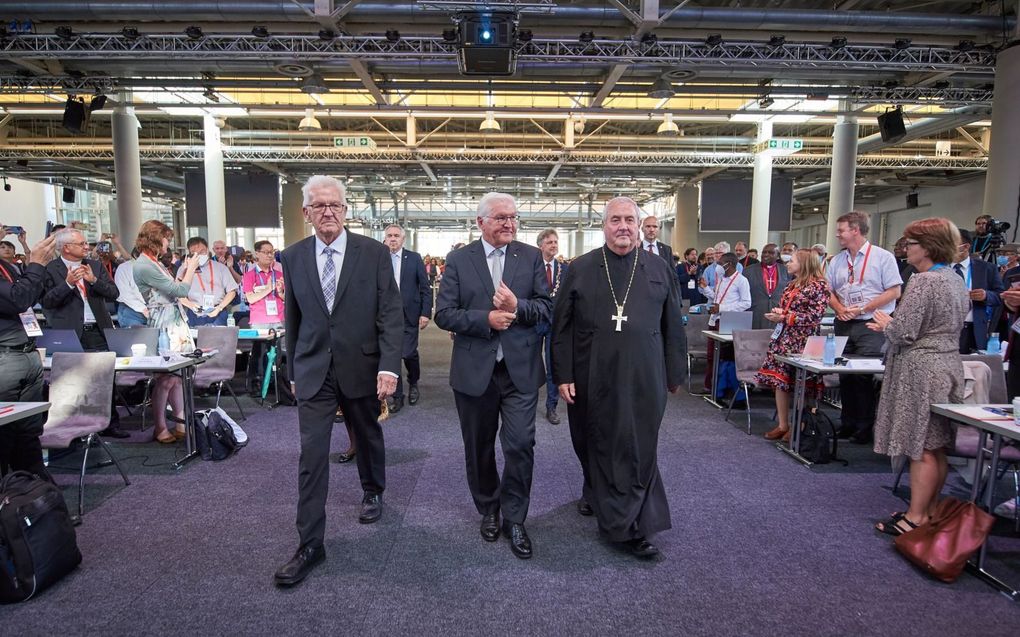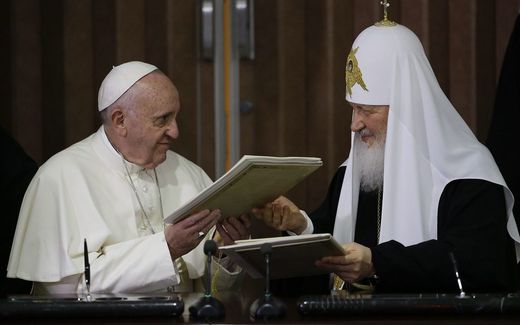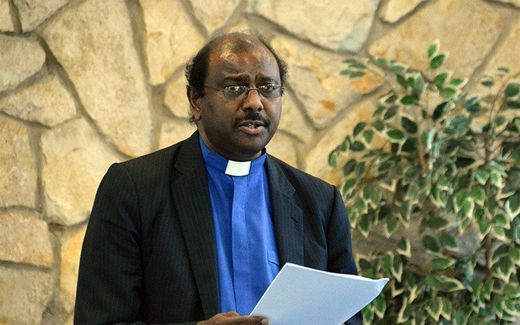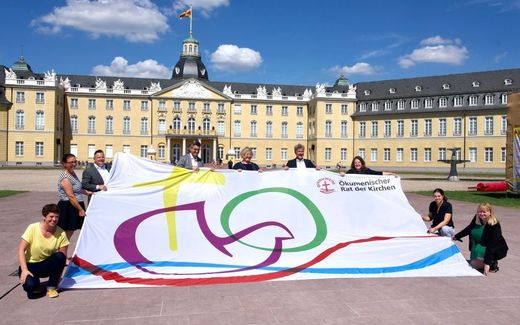World Council of Churches Assembly marked by War Ukraine
01-09-2022
European Union
Klaas van der Zwaag, RD

The German President Frank-Walter Steinmeier (m.) held a speech on Wednesday for the World Council of Churches. On his left is Winfried Kretschmann, Prime-Minister of Baden-Württemberg and prof. Ioan Sauca (r.), the acting Secretary General of the World Council. Photo WCC, Albin Hillert
European Union
The war in Ukraine marked the first meeting day of the Assembly of the World Council of Churches in Karlsruhe, Germany, on Wednesday.
Acting Secretary-General Prof. Ioan Sauca defends the decision not to deprive the Russian Orthodox Church of its membership. But German President Frank-Walter Steinmeier wants the World Council to show more teeth.
A World Council delegation led by Prof. Sauca paid a solidarity visit to Ukraine in August. During that visit, Sauca invited eleven Ukrainian church representatives to the assembly. "They are now sitting at one table with the Russian Orthodox," he told a press conference on Wednesday somewhat triumphantly. "I am therefore full of hope."
He calls the war in Ukraine "an open wound" in today's world. "This war has global consequences because of the nuclear threat and the food crisis that affects people in many parts of the world. From the very beginning, the World Council condemned the war and called for its immediate end, for respect for international law and the sovereignty of Ukraine. War can never be just or holy."
However, in June, the Central Committee unanimously rejected the proposal to exclude the Russian Orthodox Church. Prof. Sauca: "The World Council was founded as an open platform for dialogue and encounter. It is easy to exclude, excommunicate and demonise, but we are called to listen to each other. Only on the theological grounds mentioned in our foundations can the World Council exclude anyone. Nor did we expel the Dutch Reformed Church in South Africa, which supported apartheid theologically, as a member at the time."
Critique
The German President Steinmeier was considerably more critical of the World Council's attitude. He began his speech by expressing his gratitude that the World Council accepted the German churches as members shortly after the Second World War, before the founding of the Federal Republic of Germany and the German Democratic Republic, "which does not mean that it turned a blind eye. But its acceptance helped pave the way for a new start. To this day, we are grateful for this."
He recalled that "murderous anti-Semitism" had been encouraged among Christians over the centuries, in Germany and worldwide. "One of the greatest current responsibilities of Christian churches worldwide is to take a stand against anti-Semitism. The security of the Jewish community in Germany, Israel, and throughout the world must be one of the tenets of all religions. We must never allow religion, which is meant to encourage and build people up, to become a means of humiliating others, an instrument of hatred and violence."
And so the war in Ukraine was soon brought up, and the President addressed the Russian Orthodox directly at the meeting. He did make a distinction between the leadership and the ordinary clergy. "Hundreds of Russian Orthodox priests have taken a stand against the war, despite threats from Putin's regime. But the leadership of the Church has joined in the crimes of the war against Ukraine. It is currently leading the entire Church down a dangerous and even blasphemous path that goes against everything they believe in. This totalitarian ideology, disguised as theology, has led to the complete or partial destruction of so many religious sites on Ukrainian territory."
Truth
Steinmeier warmly welcomed the delegations of the churches in Ukraine. "That they are here should not be taken for granted in these times. I expect this assembly not to spare the truth about this cruel war and the criticism of the role of their church leaders. Of course, Christians are called to be bridge builders, one of their most important tasks. But building bridges requires a willingness on both sides of the river: a bridge cannot be built if the pillars that support it break down on one side."
Dialogue -the World Council's commitment- is not an end in itself but must bring to light what is happening, Steinmeier said. "A dialogue that goes no further than pious wishes and vague generalisations can, in the worst case, become a platform for justification and propaganda."
The cross -the third logo of the assembly- remains the crucial sign of Christian identity throughout the Christian community, according to Steinmeier. "It stands for compassion and mercy, for prioritising the poor, those who suffer, all people in need. But compassion should not only take the form of charity, it can and must also have political consequences."
This article was translated by CNE.news and published by the Dutch daily Reformatorisch Dagblad on September 1
Related Articles





